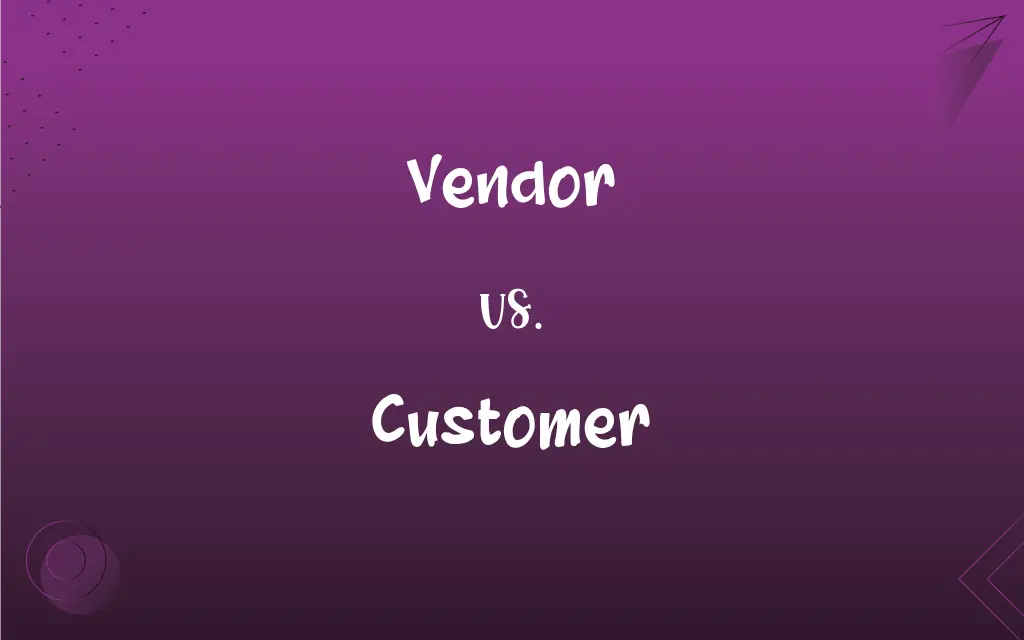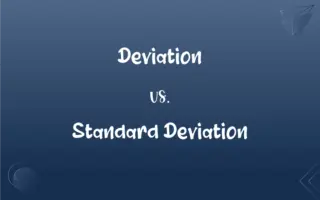Vendor vs. Customer: What's the Difference?
Edited by Aimie Carlson || By Harlon Moss || Published on December 28, 2023
Vendor refers to a person or entity selling goods or services, while a Customer is an individual or entity purchasing them.

Key Differences
A vendor is an individual or business that offers products or services for sale, focusing on delivering value to their buyers. A customer, in contrast, is the recipient of these goods or services, typically exchanging money for what the vendor offers.
Vendors are responsible for setting prices, maintaining inventory, and ensuring the quality of their offerings. Customers, however, evaluate these factors to make informed purchasing decisions.
In a transaction, the vendor provides the product or service, aiming to meet or exceed customer expectations to foster loyalty. The customer, on the other hand, provides feedback and payment, influencing the vendor's business strategies.
Vendors often engage in marketing and sales tactics to attract and retain customers. Customers, conversely, have the power to choose between different vendors, influencing market competition.
The relationship between a vendor and a customer is symbiotic; vendors rely on customers for revenue, while customers rely on vendors for the products or services they need or desire.
ADVERTISEMENT
Comparison Chart
Role in Transaction
Sells goods or services
Buys goods or services
Responsibilities
Sets prices, maintains inventory
Makes purchasing decisions
Objective
To provide products/services
To obtain needed or desired items
Influence
In marketing and product quality
In choosing vendors and giving feedback
Dependence
On customers for revenue
On vendors for supply of goods/services
ADVERTISEMENT
Vendor and Customer Definitions
Vendor
Vendors provide products or services in exchange for payment.
He became a software vendor, selling his applications online.
Customer
Customers influence market trends through their choices.
Young customers are driving the latest fashion trends.
Vendor
Vendors manage inventory and set prices for their offerings.
The street vendor adjusted prices based on demand.
Customer
Customers exchange money for products or services.
The new customer was pleased with her online purchase.
Vendor
Vendors often engage in marketing to attract customers.
As a vendor, she frequently advertised her crafts on social media.
Customer
Customers provide valuable feedback to businesses.
The company valued input from its long-time customers.
Vendor
A vendor is an individual or company that sells goods or services.
The vendor at the farmers' market offers fresh produce every weekend.
Customer
A customer is an individual or entity that purchases goods or services.
Every customer at the restaurant seemed satisfied with the service.
Vendor
Vendors play a crucial role in the supply chain.
The vendor supplied essential components to the manufacturing company.
Customer
Customers make decisions on what and where to buy.
As a regular customer, he knew exactly what he wanted.
Vendor
One that sells or vends something
A street vendor.
A vendor of software products on the Web.
FAQs
What is a vendor?
A vendor is a person or company offering something for sale, especially a trader in the street.
Is a vendor always a company?
No, a vendor can be an individual or a company.
Is a 'supplier' the same as a vendor?
Generally, yes, though 'supplier' often implies a source of raw materials or components, while 'vendor' is more commonly used for finished goods.
Can online entities be considered vendors?
Yes, online businesses or individuals selling goods or services are considered vendors.
Are vendors always involved in retail?
Not necessarily. Vendors can be involved in various levels of trade, including wholesale.
How is a vendor different from a merchant?
The terms are often used interchangeably, but 'merchant' typically refers to someone with a broader business scope, possibly including the sourcing and selling of products, while a 'vendor' focuses more on sales.
Can a vendor sell services instead of goods?
Yes, vendors can sell either goods or services.
Can a vendor be a temporary setup?
Yes, vendors can be temporary, such as those at fairs or markets.
Can a business be a customer?
Yes, businesses often purchase goods or services from other businesses.
Do vendors need a license to operate?
This depends on local laws and the type of goods or services they are selling.
What defines a customer?
A customer is an individual or organization that buys goods or services from a store or business.
Are vendors always for-profit entities?
Most often, yes, but there can be non-profit or community-based vendors.
Are customers always buyers of goods?
No, customers can also purchase services.
Can a customer also be a vendor?
Yes, in certain situations, a customer can also be a vendor, especially in B2B (business-to-business) contexts.
How do businesses attract customers?
Businesses attract customers through marketing, advertising, quality products, good service, and competitive pricing.
Is a customer always an individual?
No, a customer can be an individual, a group, or an organization.
Is there a difference between a client and a customer?
The terms are often used interchangeably, but 'client' usually implies a longer-term, more professional relationship.
Do customers have rights?
Yes, customers have various rights, such as the right to receive the advertised product or service.
Is customer feedback important for businesses?
Yes, customer feedback is crucial for businesses to improve their products or services.
Can a customer be a one-time buyer?
Yes, customers can engage in a single transaction or be repeat buyers.
About Author
Written by
Harlon MossHarlon is a seasoned quality moderator and accomplished content writer for Difference Wiki. An alumnus of the prestigious University of California, he earned his degree in Computer Science. Leveraging his academic background, Harlon brings a meticulous and informed perspective to his work, ensuring content accuracy and excellence.
Edited by
Aimie CarlsonAimie Carlson, holding a master's degree in English literature, is a fervent English language enthusiast. She lends her writing talents to Difference Wiki, a prominent website that specializes in comparisons, offering readers insightful analyses that both captivate and inform.































































